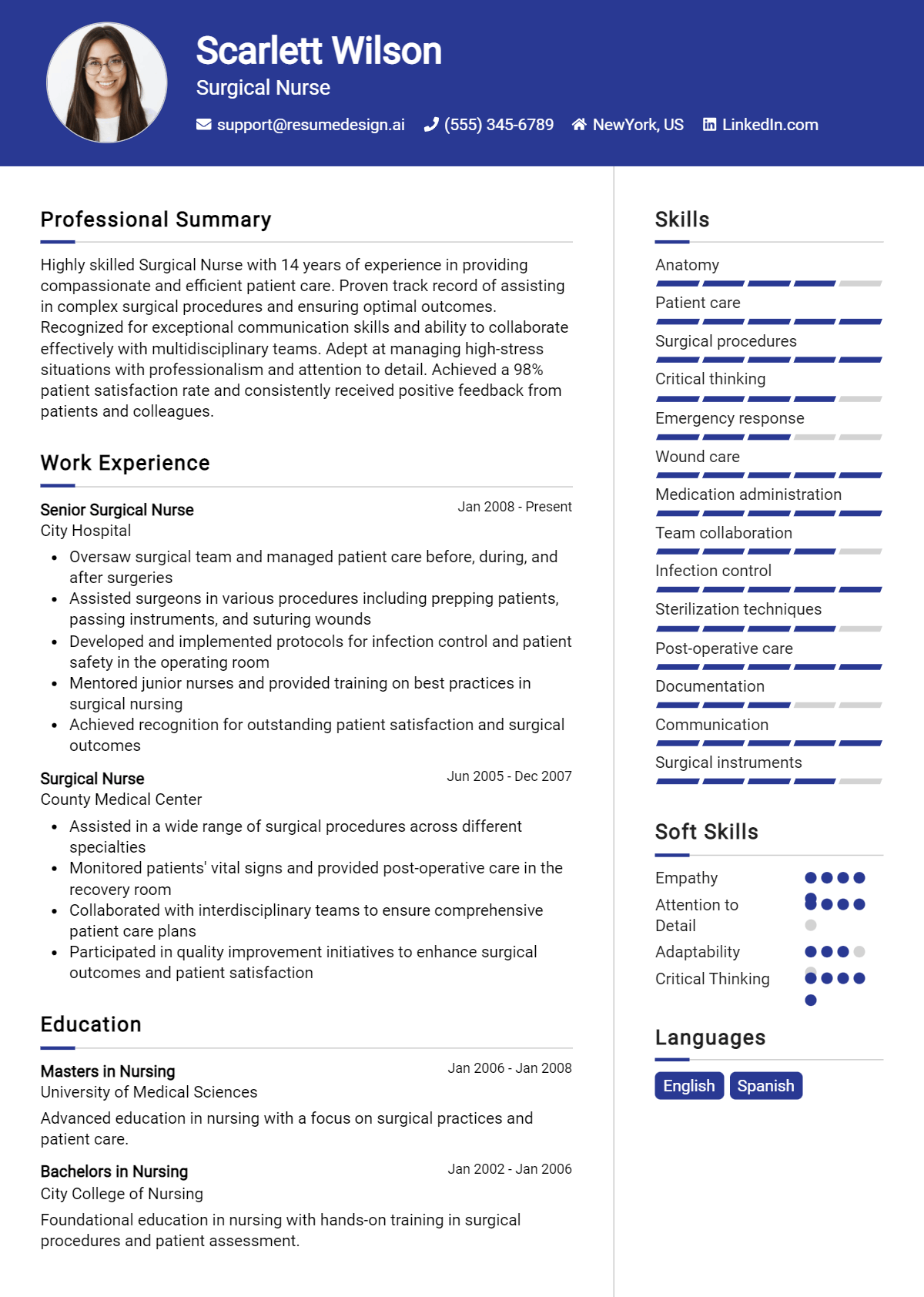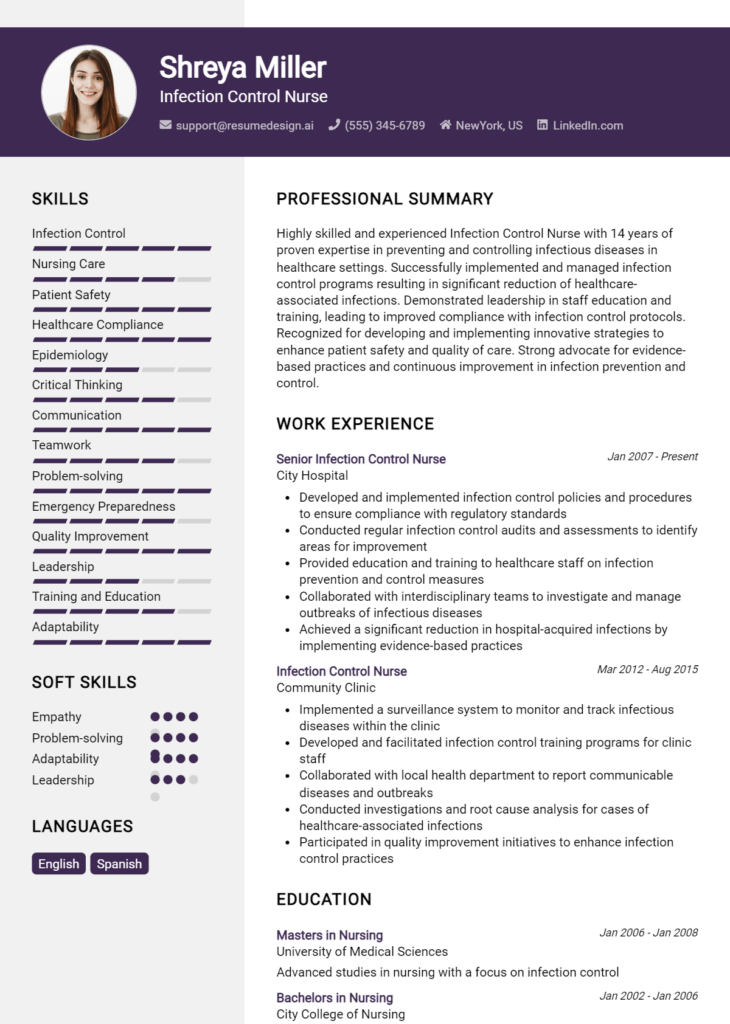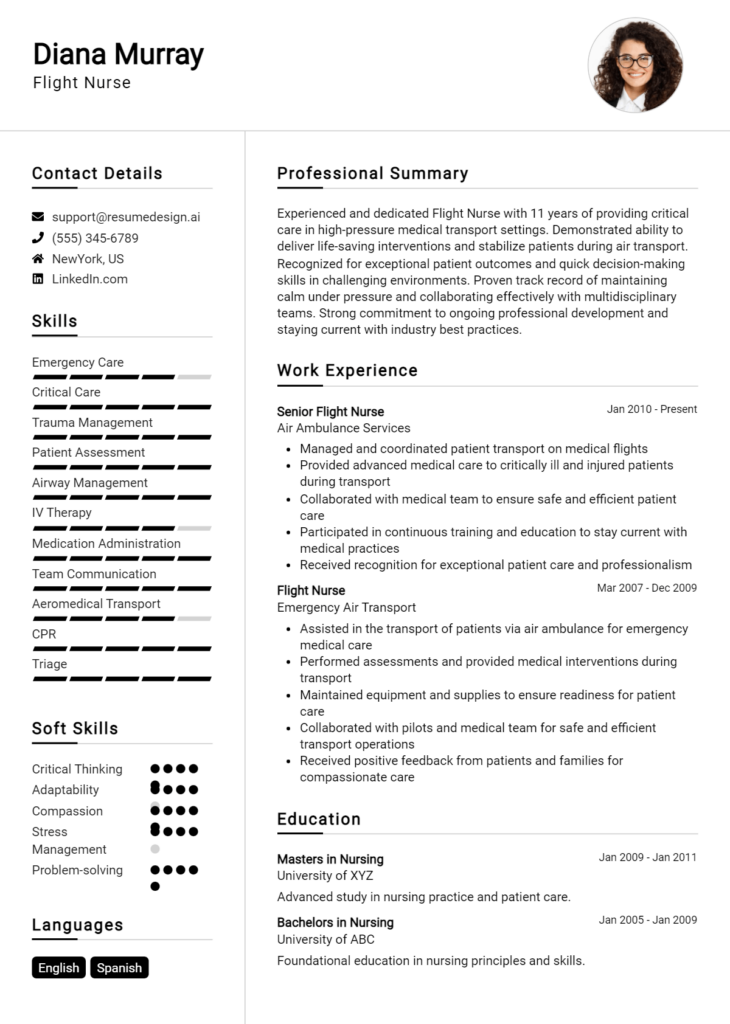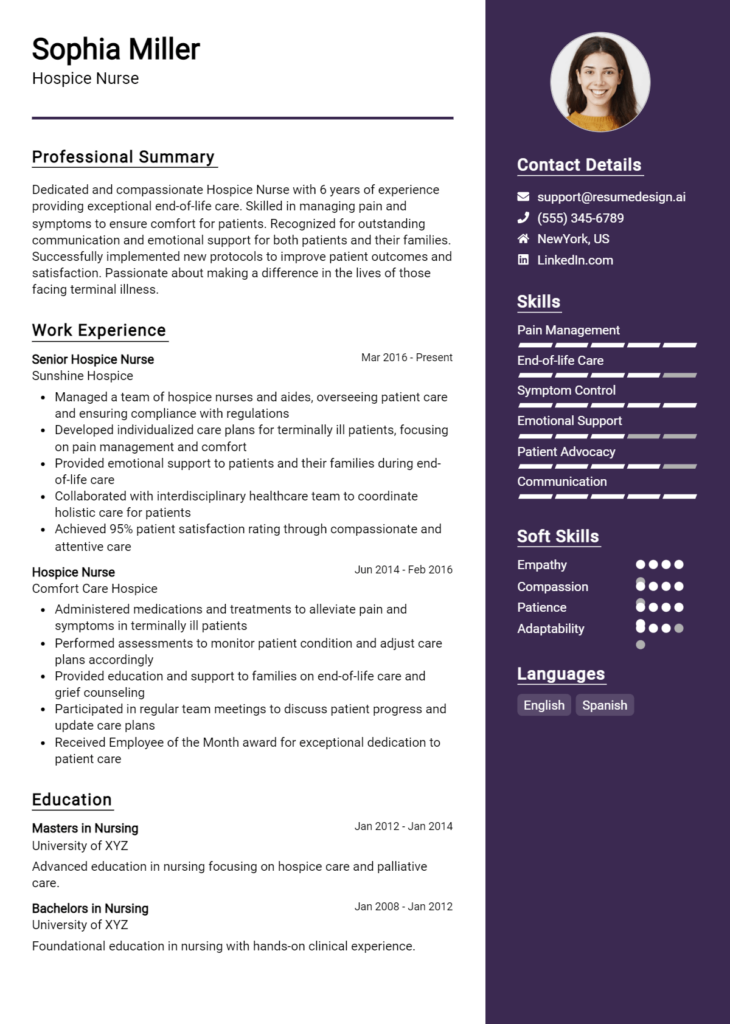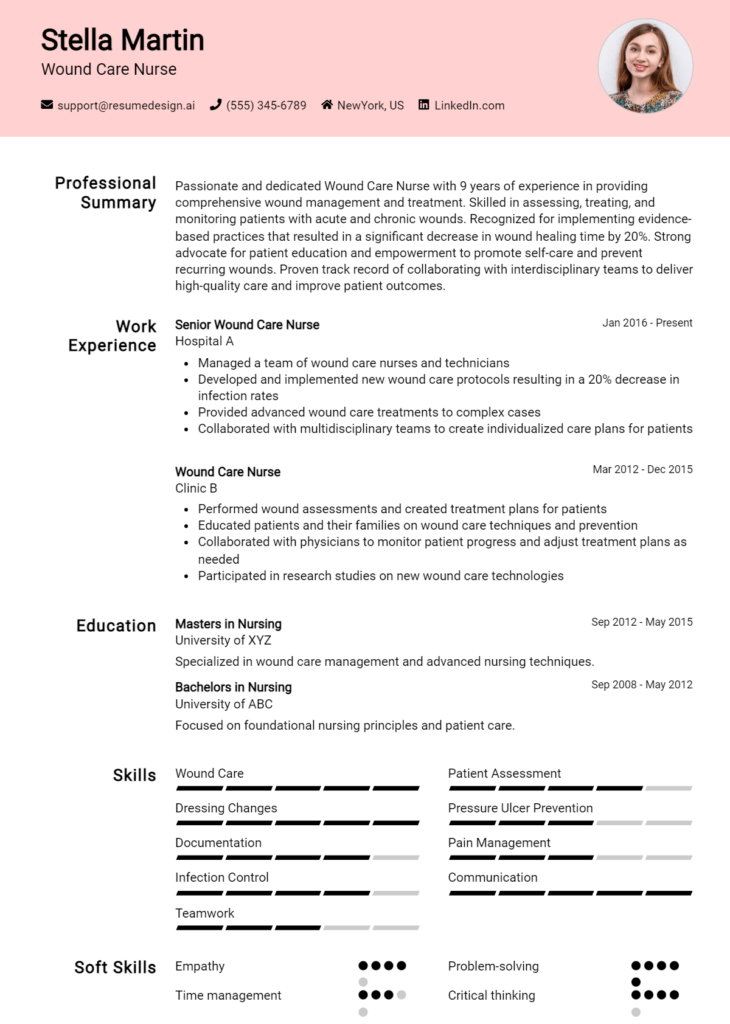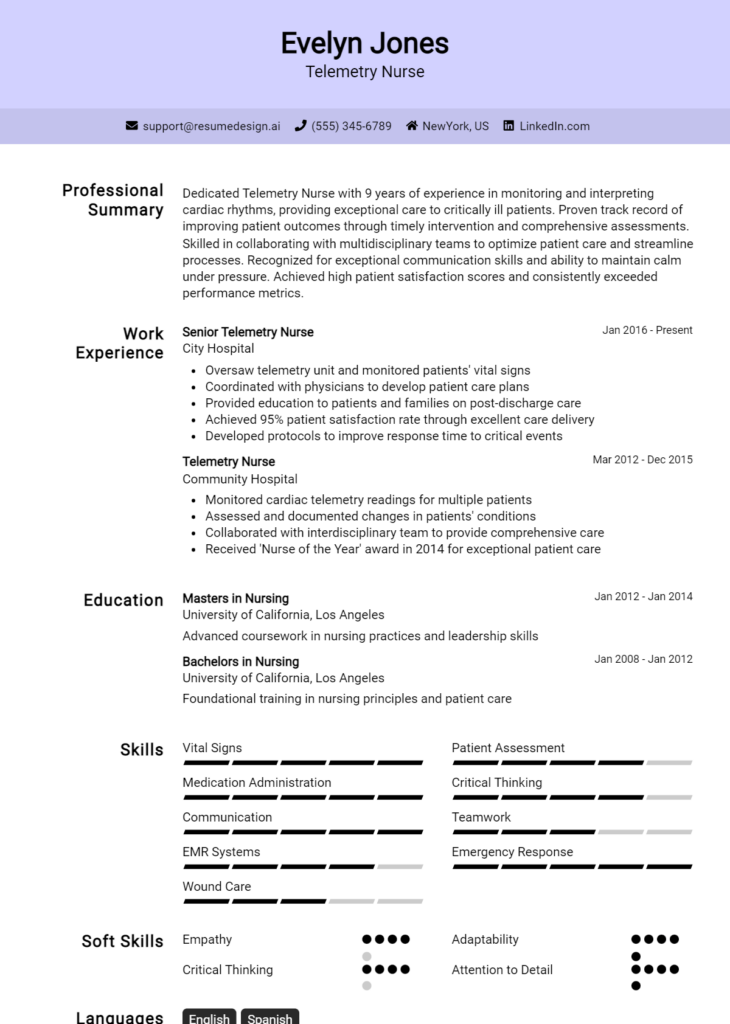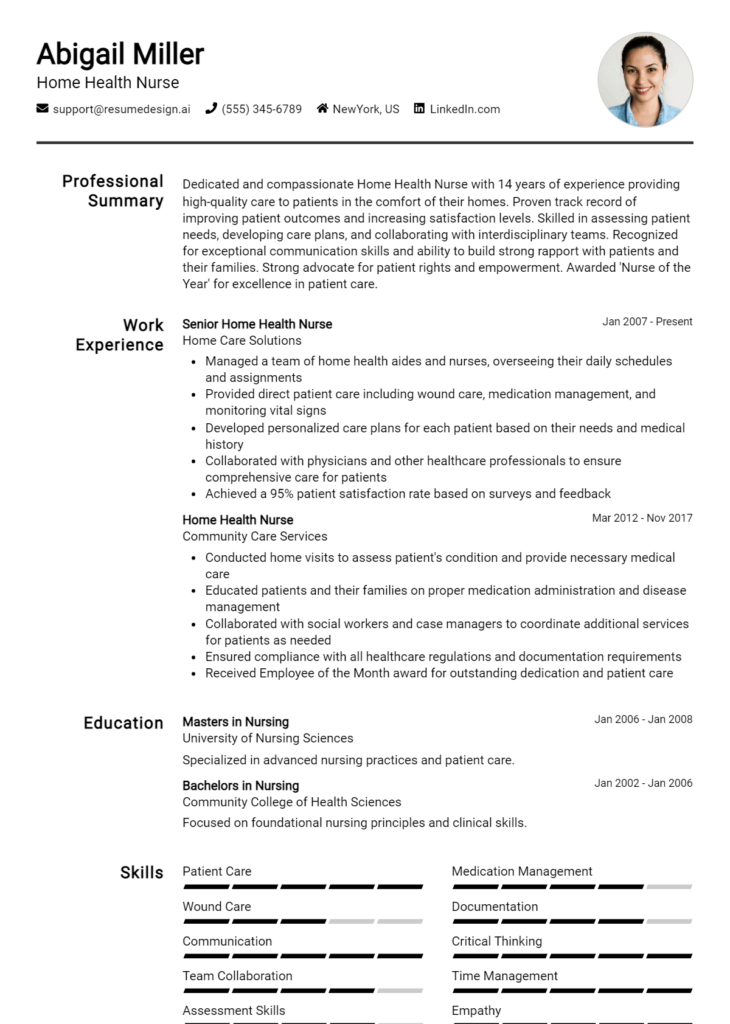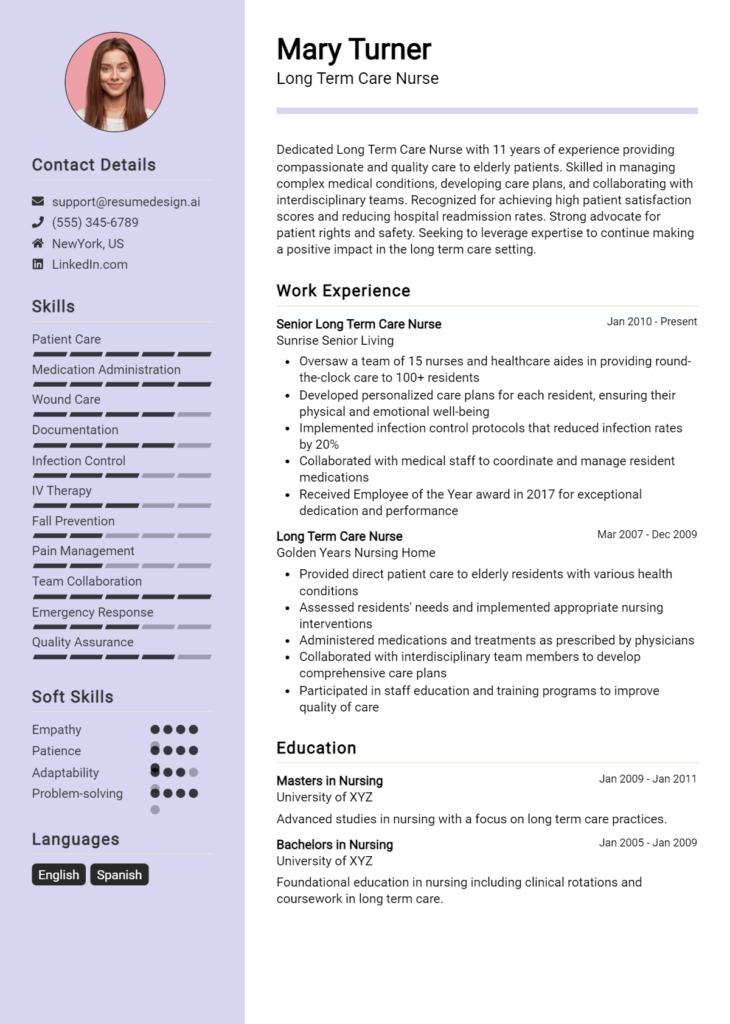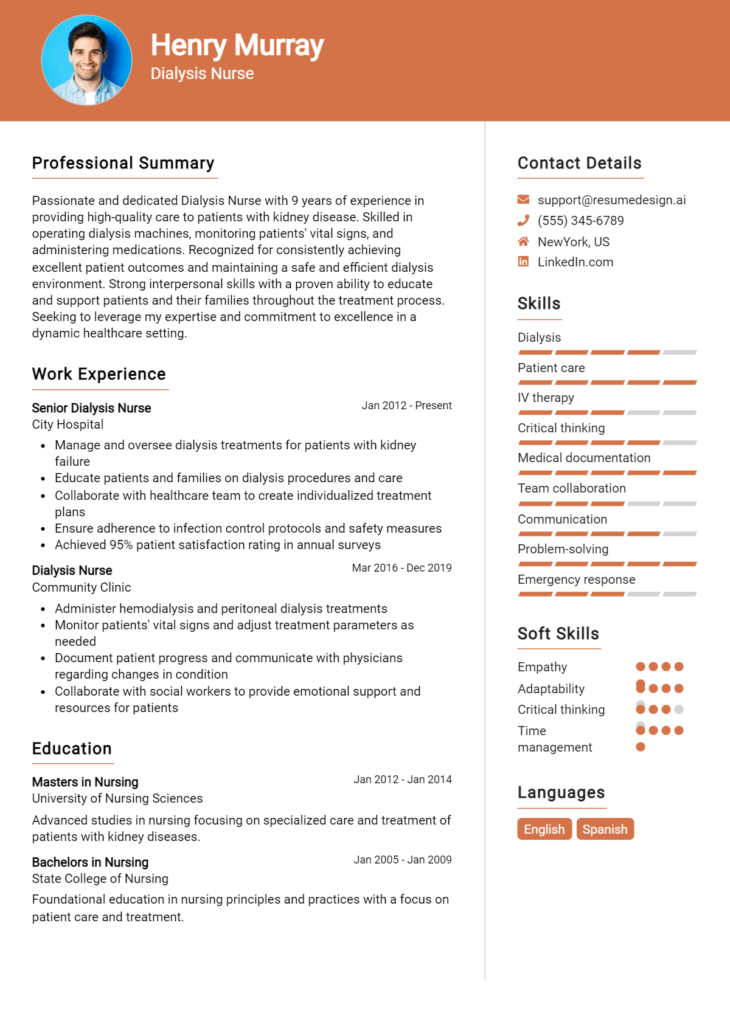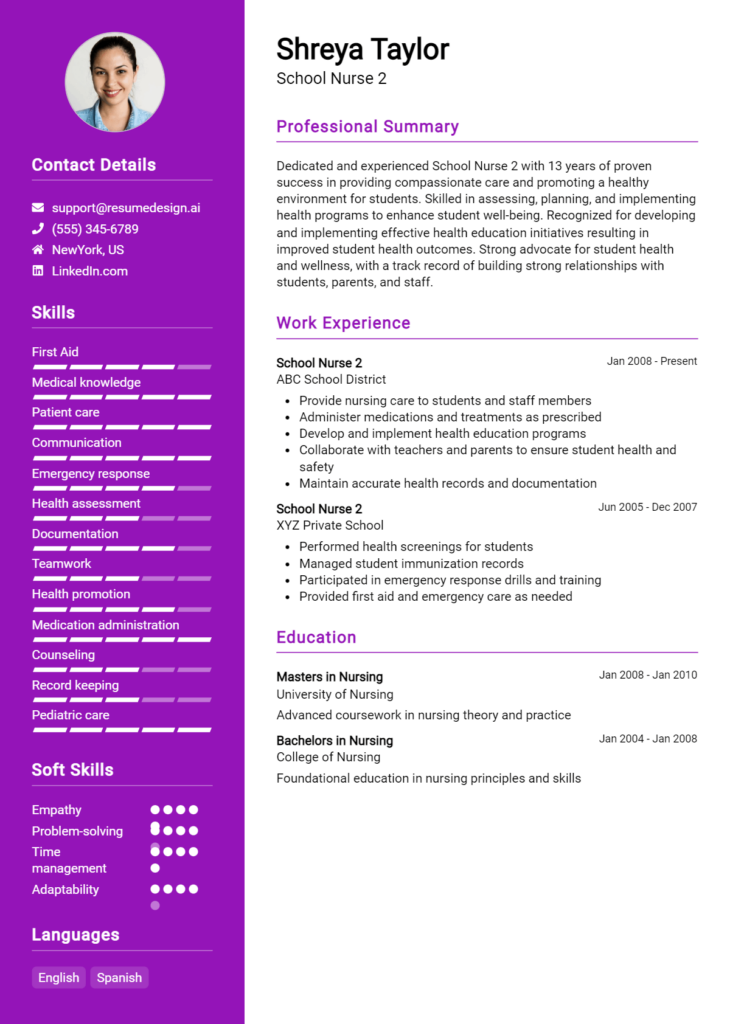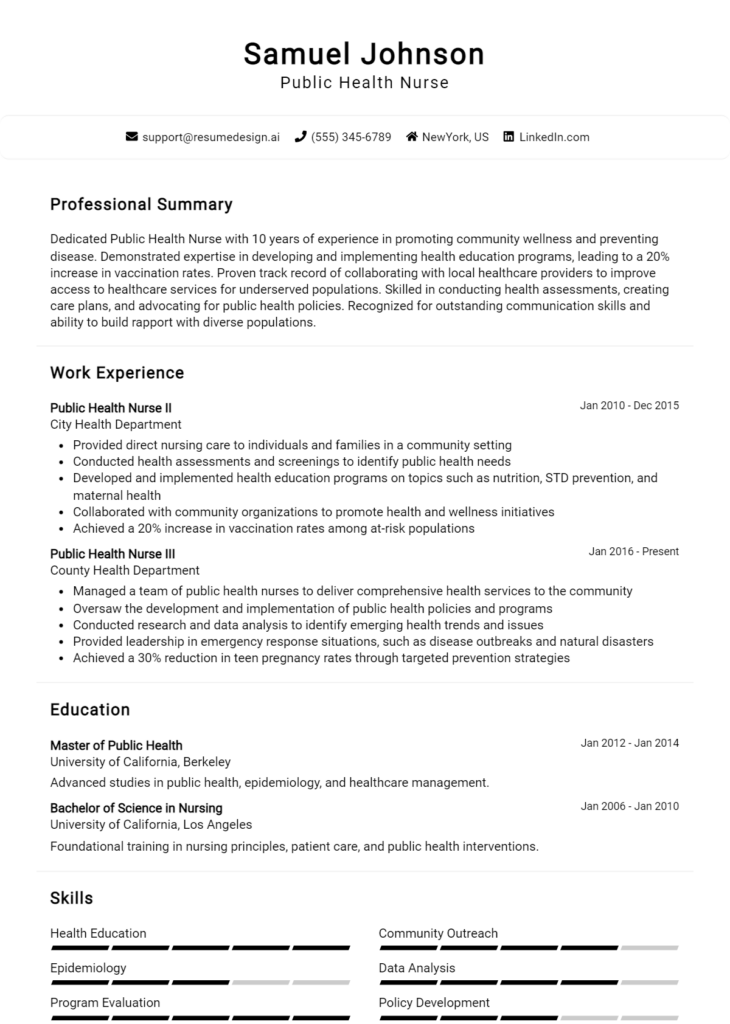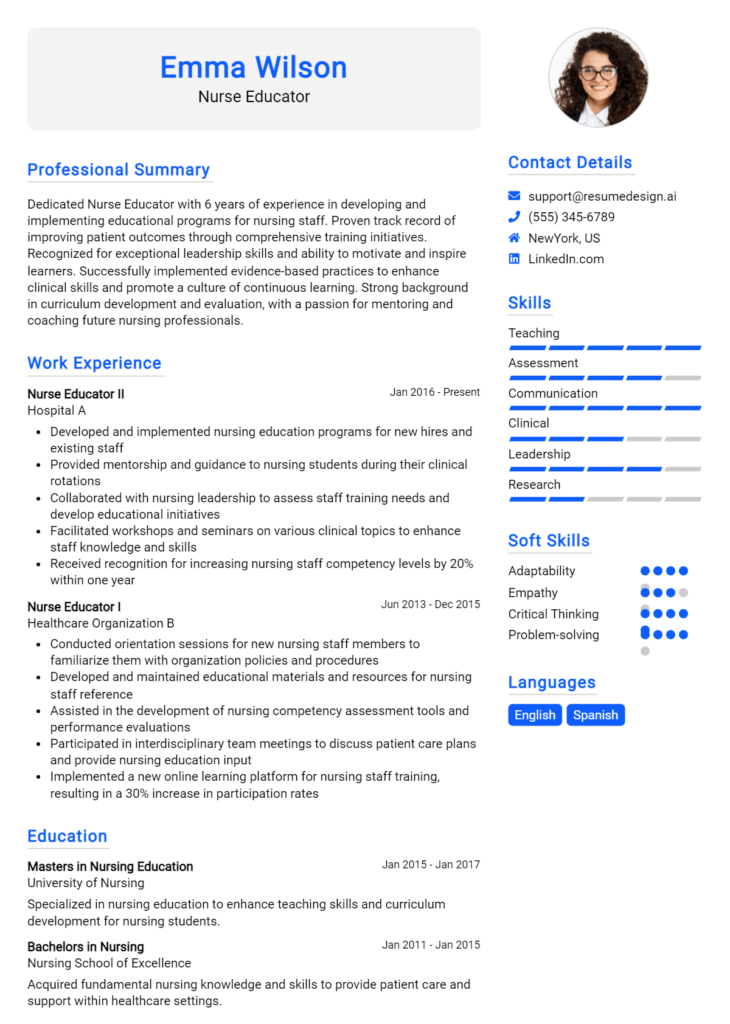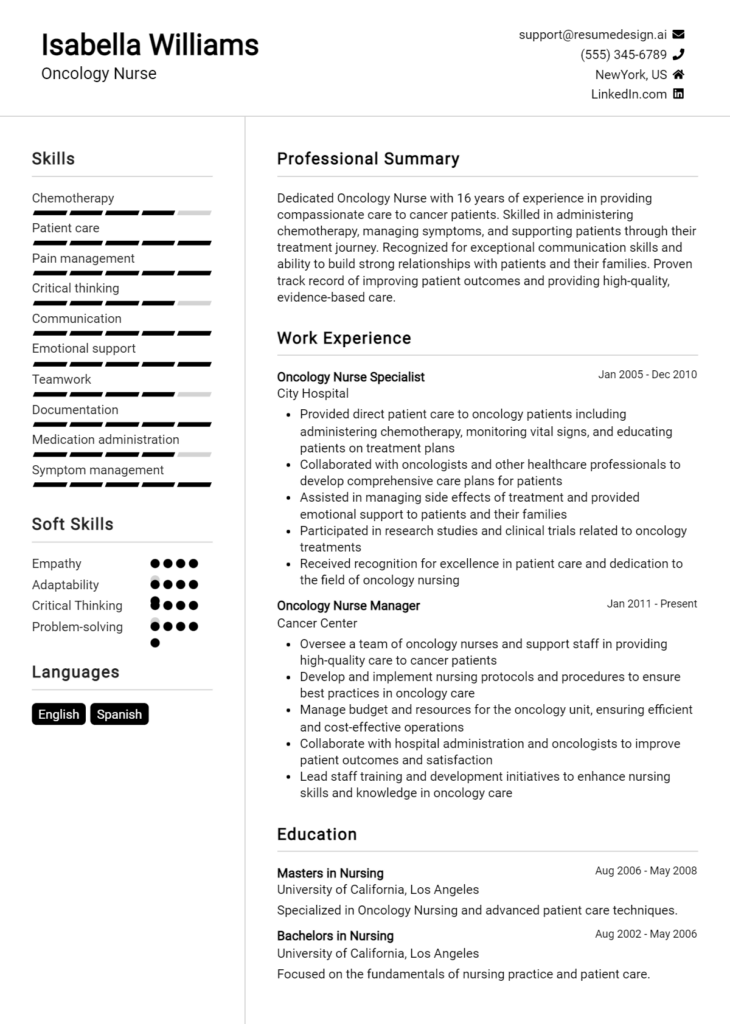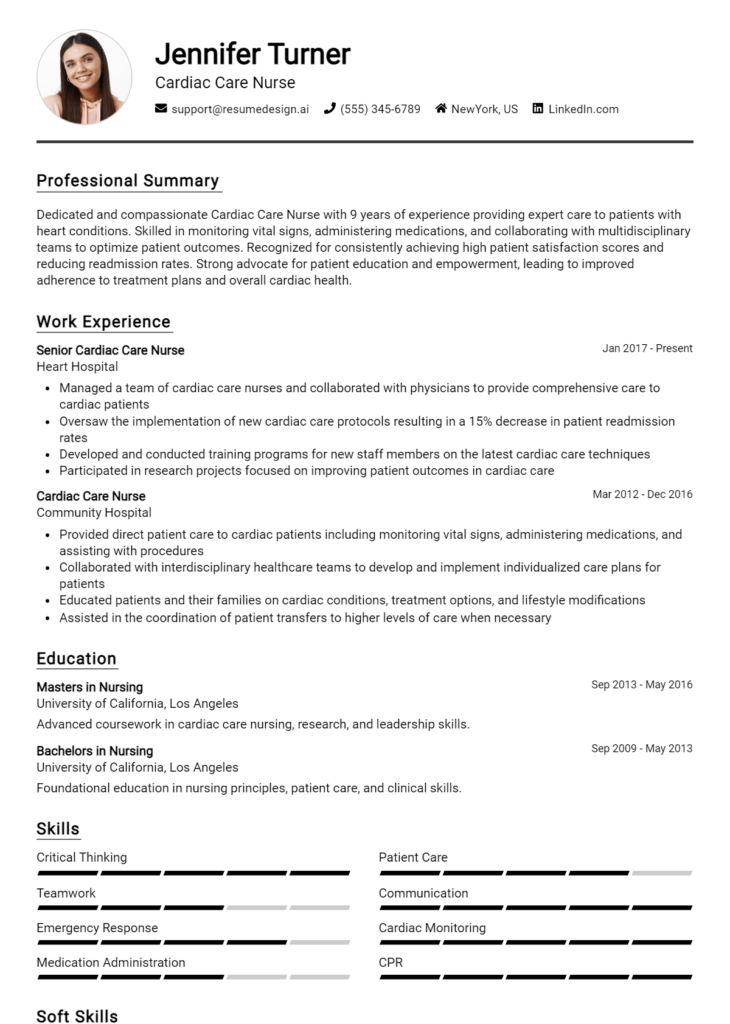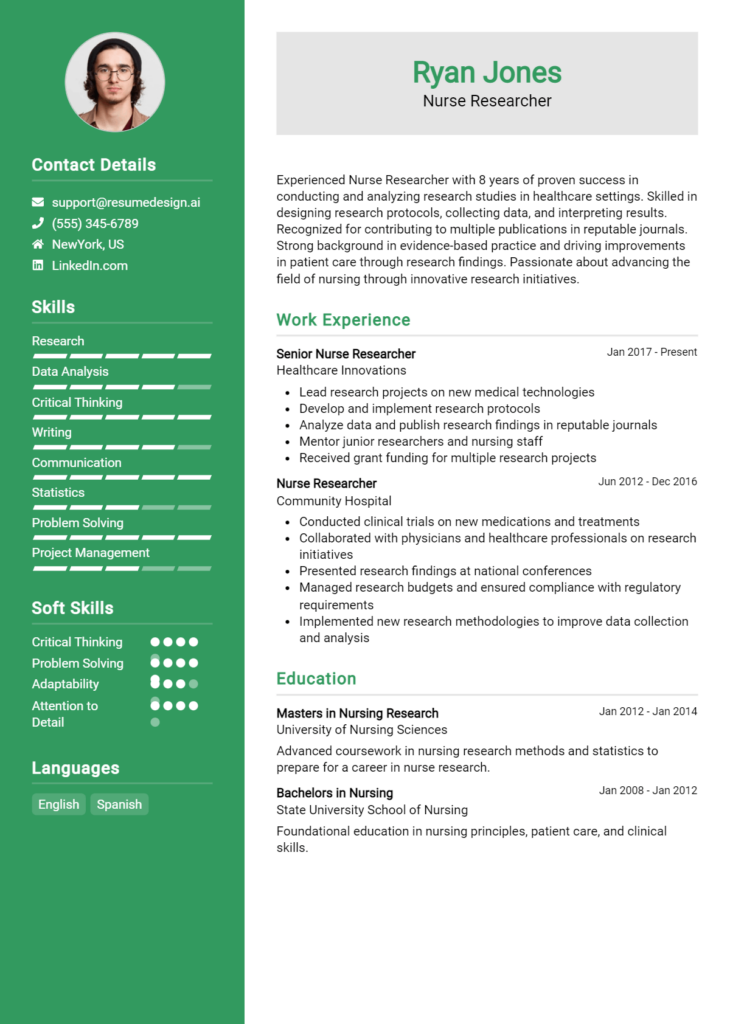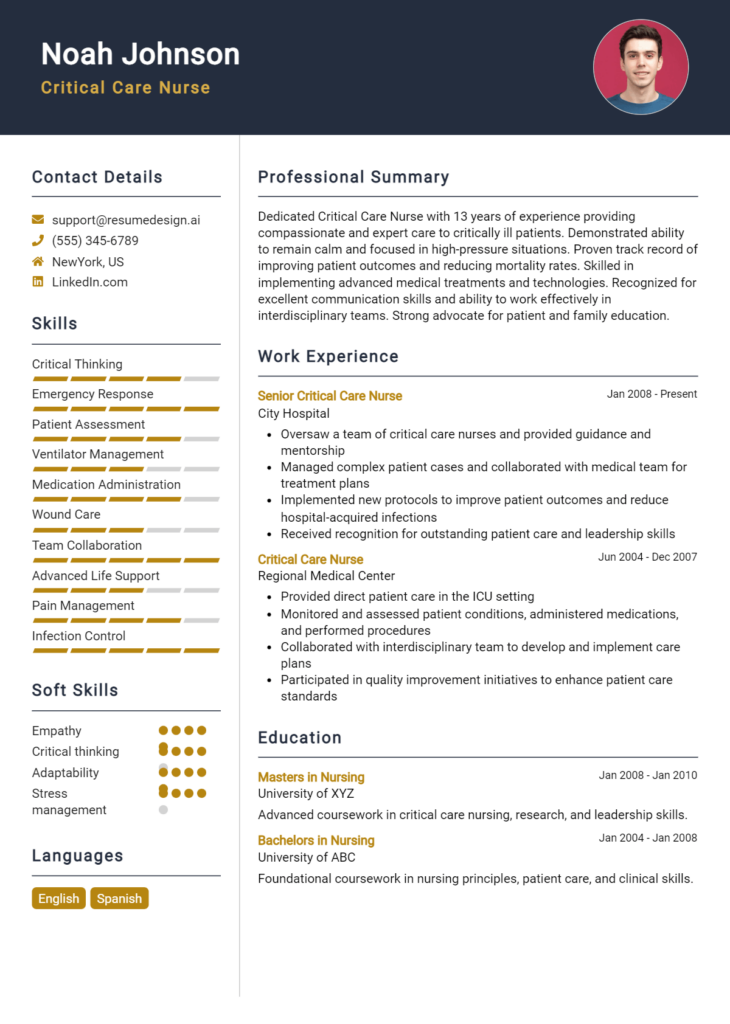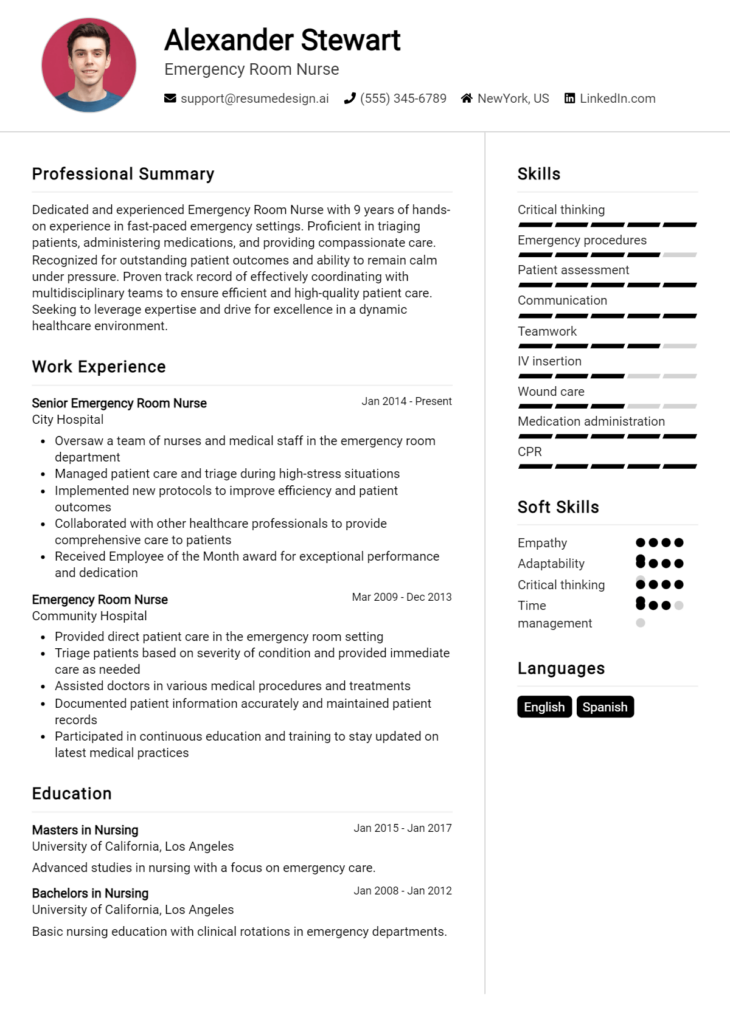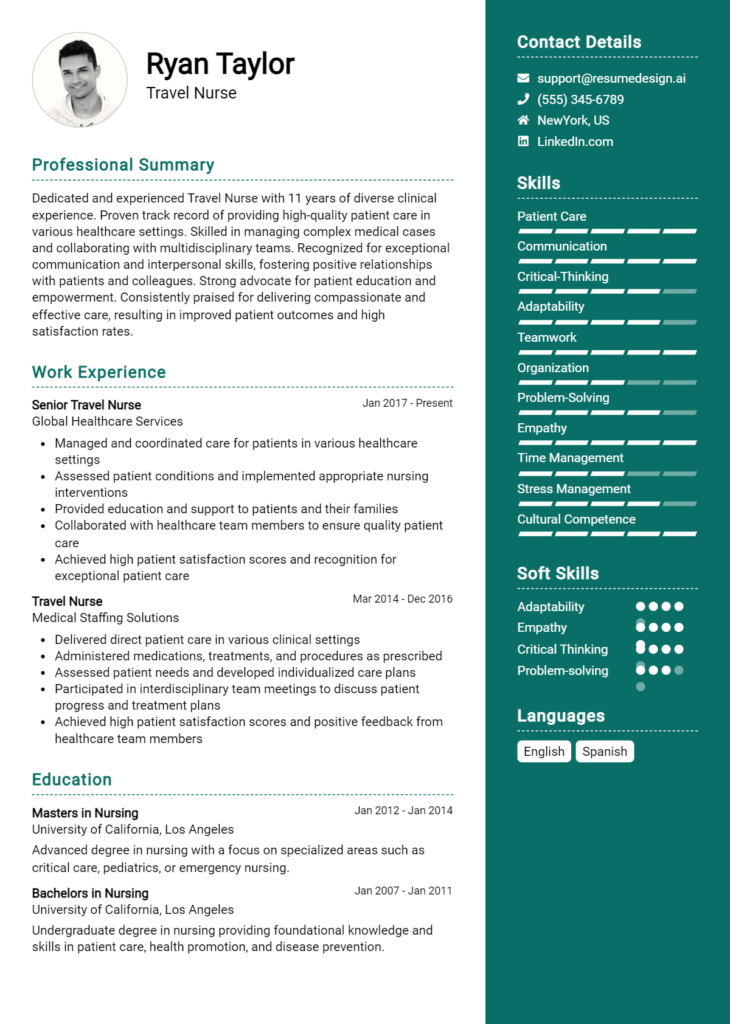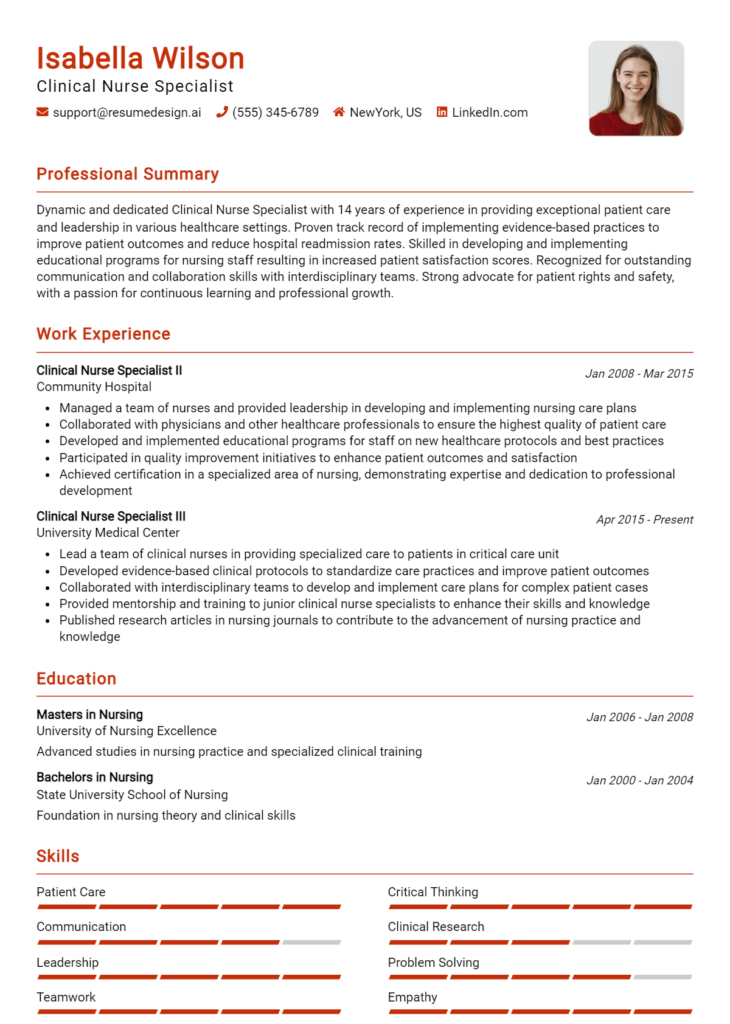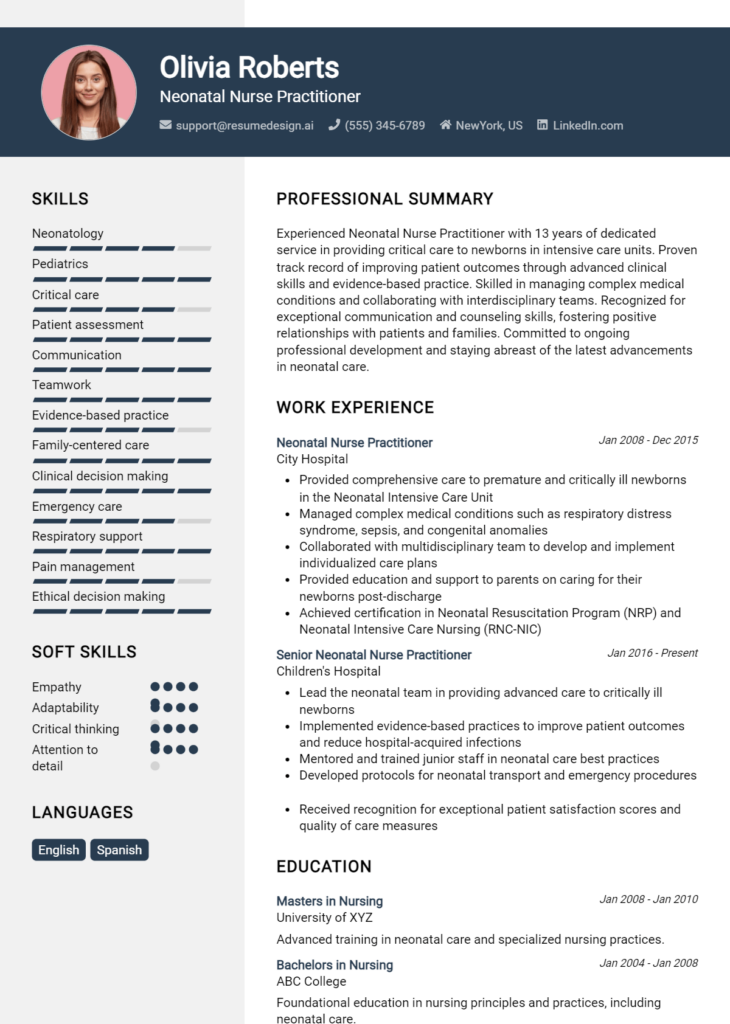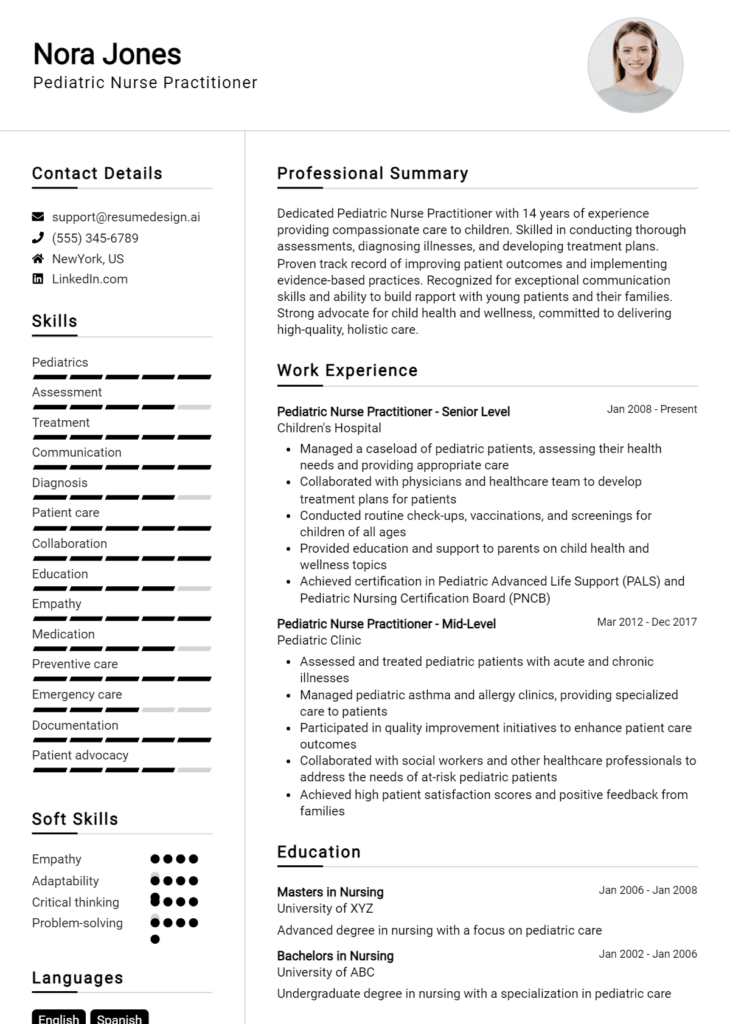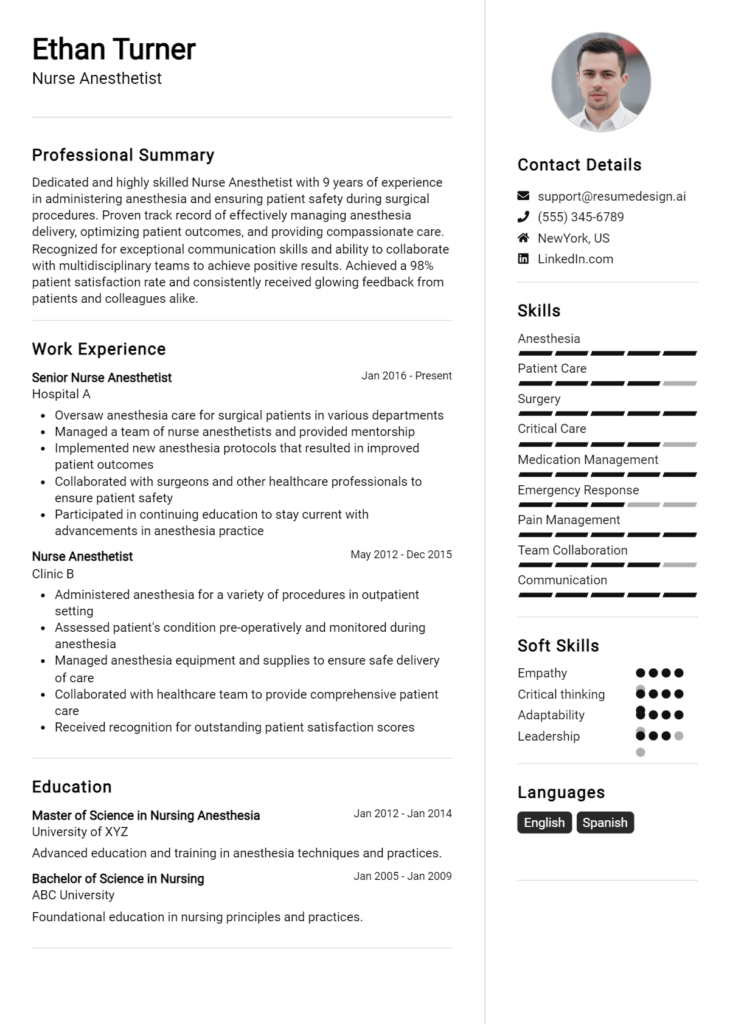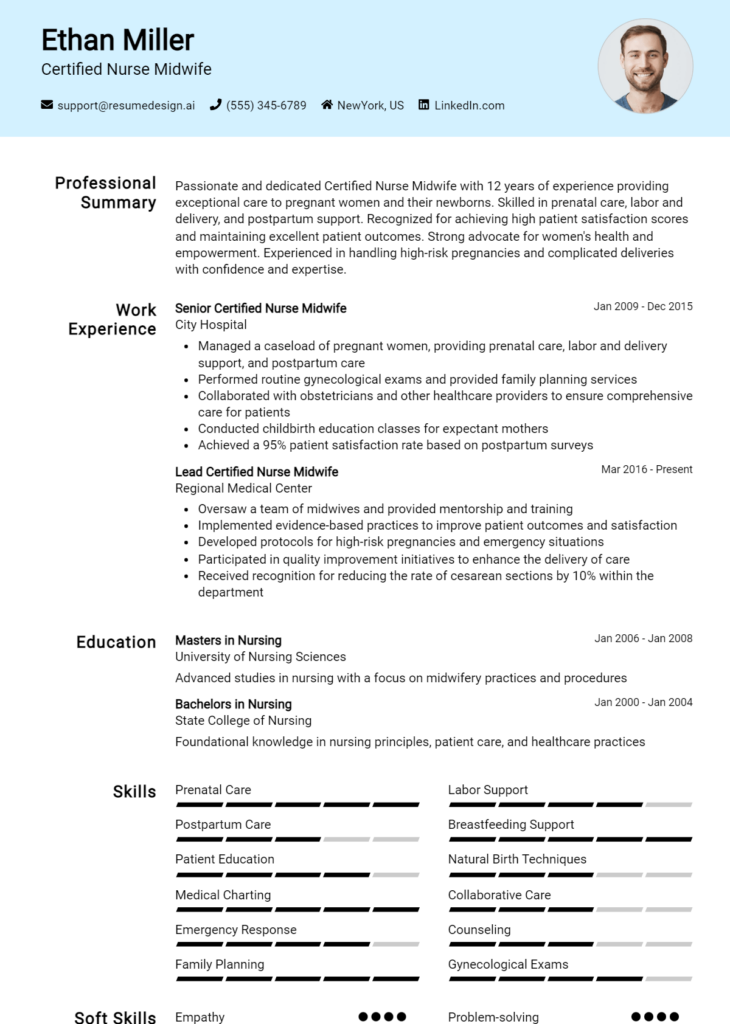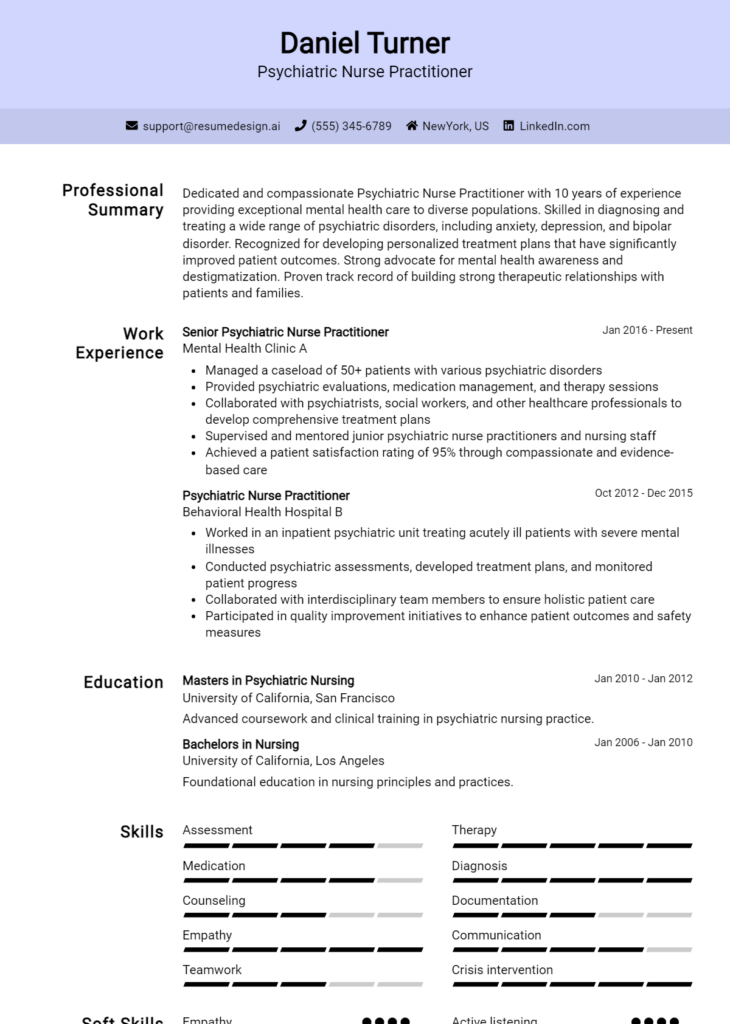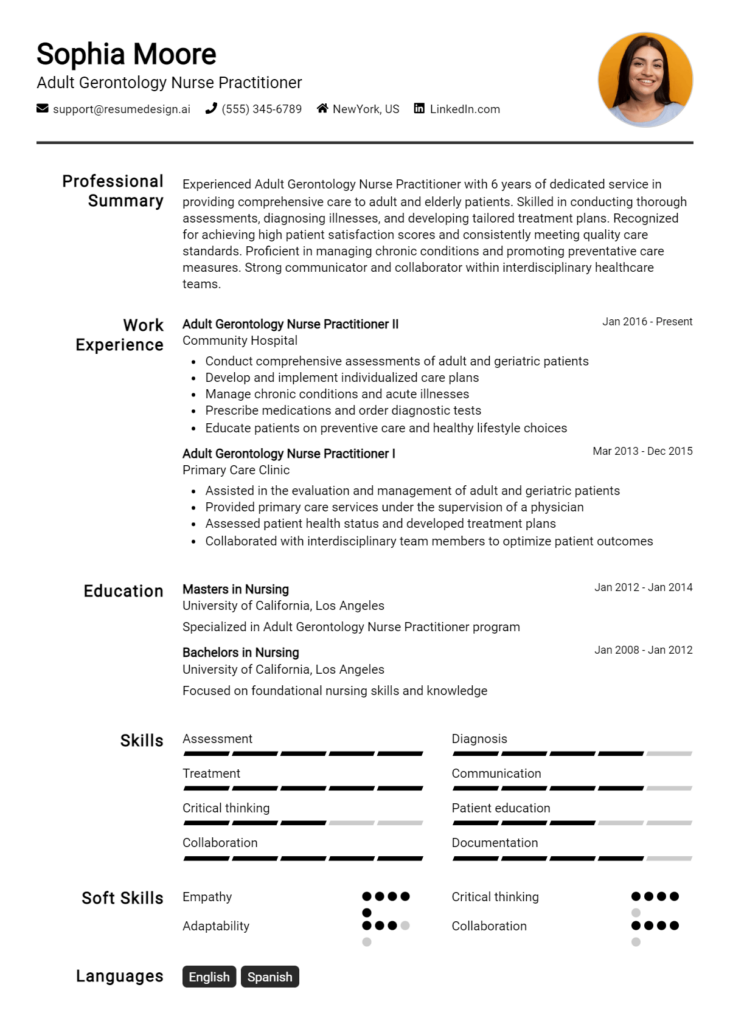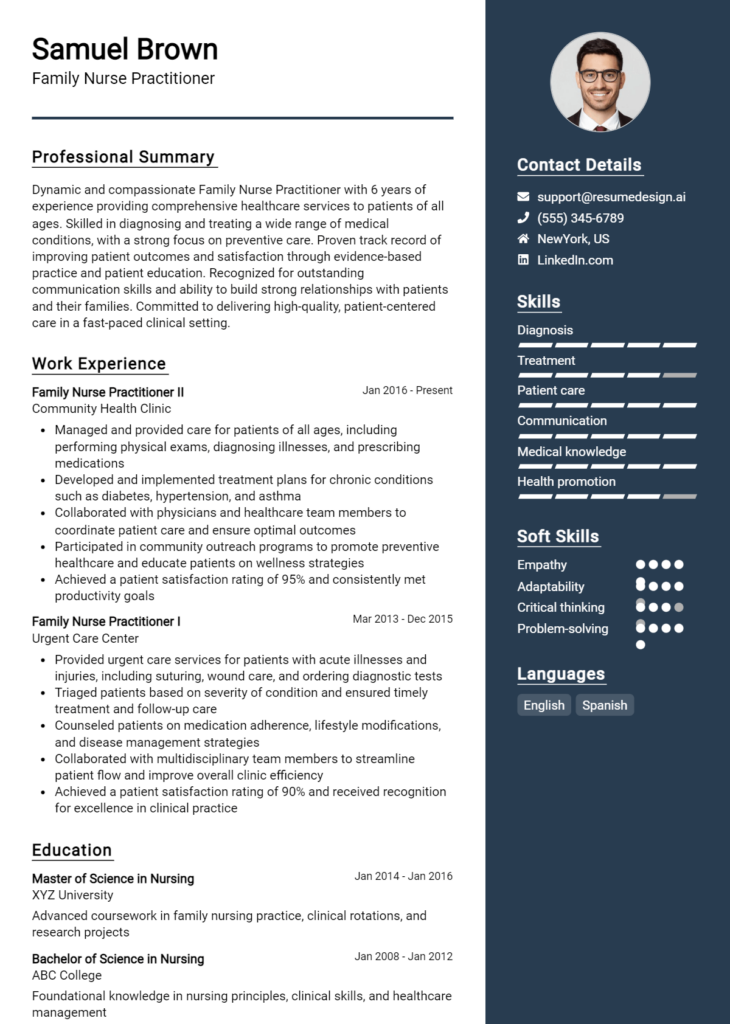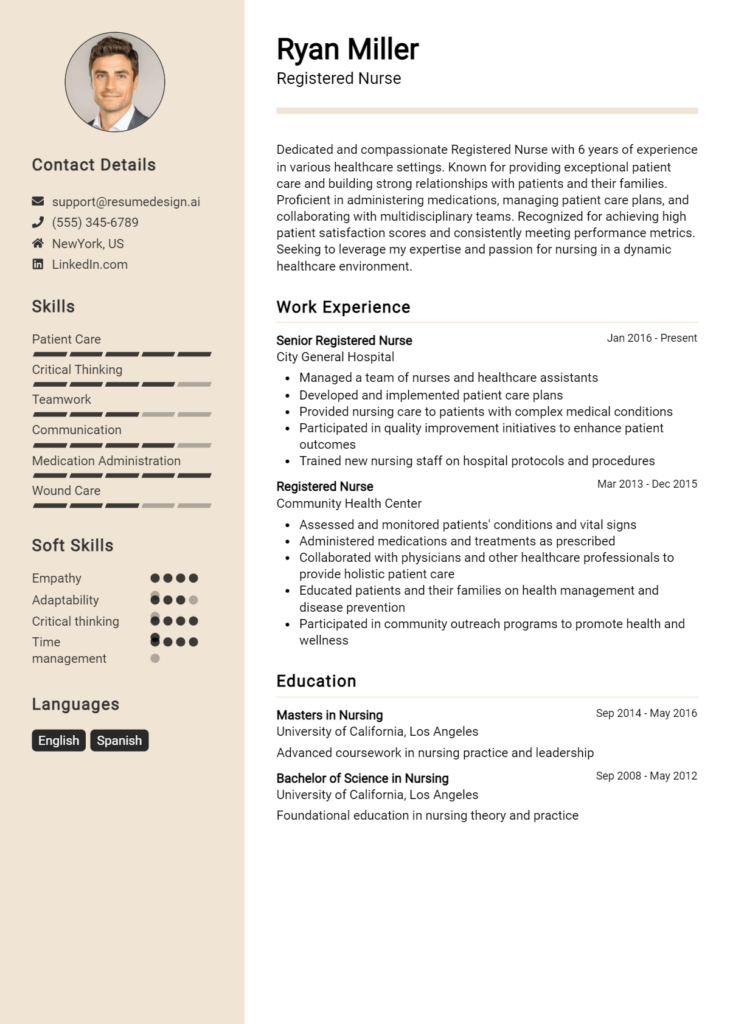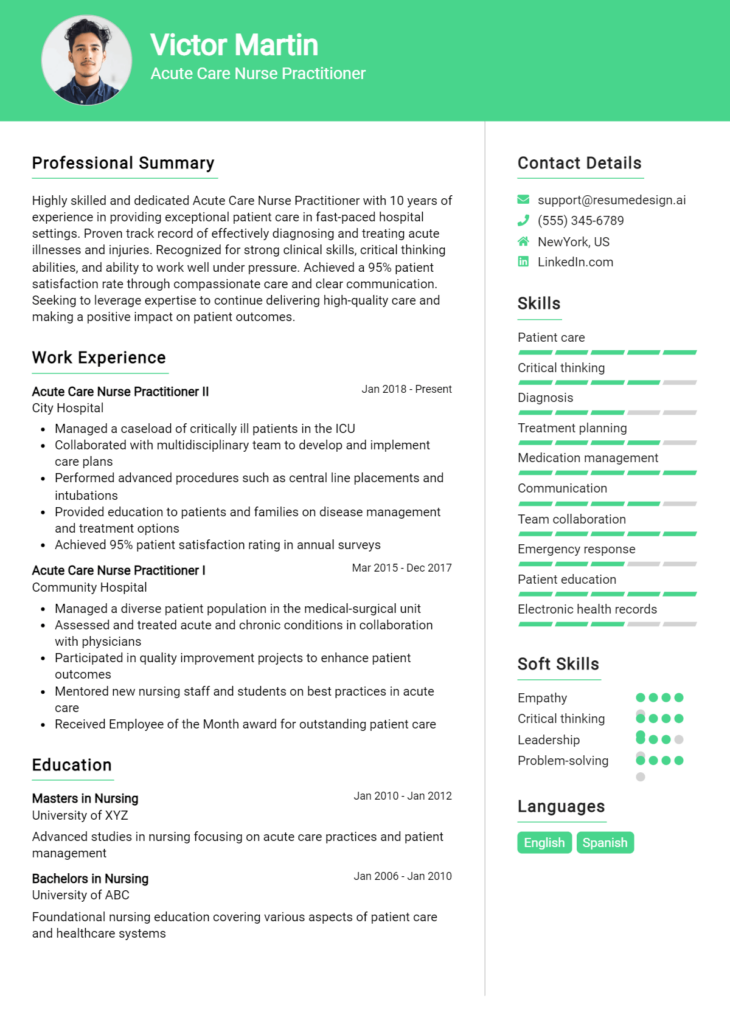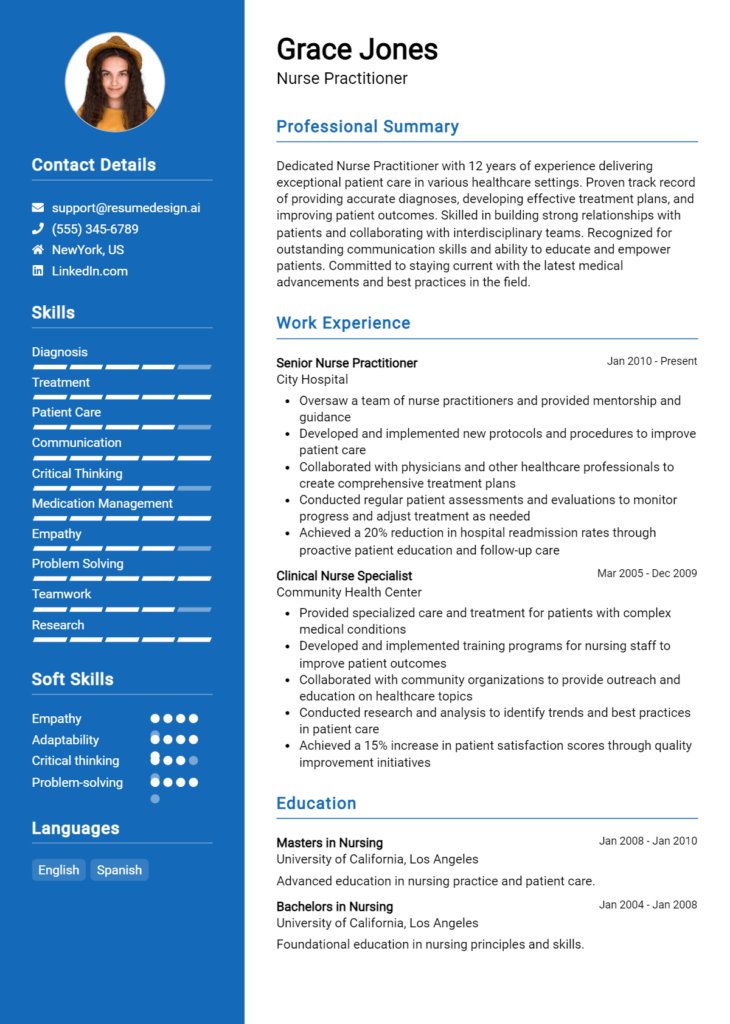Surgical Nurse Core Responsibilities
A Surgical Nurse plays a critical role in the operating room, ensuring patient safety and the smooth functioning of surgical procedures. Key responsibilities include preparing the surgical site, managing instruments, and monitoring patient vitals during surgery. This role demands strong technical skills, operational efficiency, and exceptional problem-solving abilities to navigate the complexities of surgical environments effectively. By bridging communication between surgical teams and departments, Surgical Nurses significantly contribute to achieving organizational goals, and a well-crafted resume can effectively showcase these vital qualifications.
Common Responsibilities Listed on Surgical Nurse Resume
- Assisting in preparing the operating room for surgical procedures
- Maintaining sterile conditions and ensuring equipment readiness
- Monitoring patient vital signs before, during, and after surgery
- Administering medications and anesthesia as directed by the surgeon
- Collaborating with surgeons, anesthesiologists, and other medical staff
- Documenting surgical procedures and patient care accurately
- Providing pre-operative and post-operative patient education
- Responding swiftly to emergencies and complications during surgery
- Assisting with patient positioning and draping during surgery
- Participating in quality assurance and safety protocols
- Continuing education and staying updated on surgical practices
High-Level Resume Tips for Surgical Nurse Professionals
A well-crafted resume is crucial for Surgical Nurse professionals, as it serves as the first impression a candidate makes on potential employers. In a highly competitive healthcare landscape, your resume must effectively showcase not only your nursing skills but also your achievements in the operating room and beyond. A strong resume can highlight your ability to work under pressure, your attention to detail, and your commitment to patient care. This guide will provide practical and actionable resume tips specifically tailored for Surgical Nurse professionals, ensuring you stand out in a crowded job market.
Top Resume Tips for Surgical Nurse Professionals
- Tailor your resume to each job description by incorporating relevant keywords and phrases.
- Highlight your surgical experience, including specific procedures you are skilled in assisting with.
- Quantify your achievements, such as the number of surgeries assisted or the reduction in patient recovery time.
- Showcase your certifications and licenses, including any specialized training in surgical nursing.
- Emphasize soft skills, such as communication and teamwork, which are essential in the surgical setting.
- Include a professional summary at the top that encapsulates your experience and aspirations in surgical nursing.
- List any relevant continuing education courses or workshops that demonstrate your commitment to professional development.
- Utilize action verbs to describe your responsibilities and achievements, making your resume more dynamic.
- Keep the format clean and professional, ensuring easy readability for hiring managers.
- Proofread carefully to eliminate any typos or errors that could detract from your professionalism.
By implementing these tips, you can significantly increase your chances of landing a job in the Surgical Nurse field. A well-structured resume that highlights your skills and experiences not only captures the attention of hiring managers but also positions you as a qualified candidate ready to make a meaningful contribution to patient care in the operating room.
Why Resume Headlines & Titles are Important for Surgical Nurse
In the highly competitive field of nursing, particularly in surgical settings, a well-crafted resume headline or title is essential for capturing the attention of hiring managers. A strong headline serves as a powerful introduction, summarizing a candidate's key qualifications and competencies in a concise phrase. This immediate impact is crucial, as hiring managers often sift through numerous applications; thus, a compelling headline can differentiate a candidate from the rest. It should be concise, relevant, and directly related to the surgical nursing role being applied for, ensuring that it resonates with the specific demands and expectations of the position.
Best Practices for Crafting Resume Headlines for Surgical Nurse
- Keep it concise: Aim for one impactful phrase that captures your essence.
- Be role-specific: Use keywords that reflect the surgical nursing position you're targeting.
- Highlight key strengths: Focus on your most relevant skills and experiences.
- Use action verbs: Start with strong action verbs to convey a sense of proactivity.
- Tailor for each application: Customize your headline for each job application to reflect the specific requirements.
- Avoid jargon: Use clear language that can be easily understood by anyone reviewing your resume.
- Showcase accomplishments: If possible, integrate a notable achievement that adds credibility.
- Maintain professionalism: Ensure the tone aligns with the standards of the nursing profession.
Example Resume Headlines for Surgical Nurse
Strong Resume Headlines
Dedicated Surgical Nurse with 5+ Years of Experience in High-Pressure Operating Rooms
Compassionate Surgical Nurse Specializing in Patient Care and Recovery Procedures
Detail-Oriented Surgical Nurse with Proven Skills in Assisting Complex Surgeries
Certified Surgical Nurse Committed to Excellence in Patient Outcomes and Safety
Weak Resume Headlines
Nurse Looking for Job
Healthcare Professional
Experienced Nurse
Strong resume headlines are effective because they immediately convey the candidate's specific qualifications and relevance to the surgical nursing role, making it easy for hiring managers to see the value they bring. In contrast, weak headlines fail to impress due to their vagueness and lack of specificity, making it difficult for employers to gauge the candidate’s suitability for the position. A compelling headline not only attracts attention but also sets the tone for the rest of the resume, enhancing the overall impact of the application.
Writing an Exceptional Surgical Nurse Resume Summary
A well-crafted resume summary is crucial for a Surgical Nurse, as it serves as the first impression for hiring managers reviewing your application. This concise paragraph allows candidates to quickly highlight their key skills, relevant experience, and significant accomplishments in the field of surgical nursing. A strong summary can capture attention immediately, showcasing how your expertise aligns with the specific demands of the job. It should be impactful and tailored to the position you are applying for, ensuring that it resonates with the employer's expectations.
Best Practices for Writing a Surgical Nurse Resume Summary
- Quantify Achievements: Use numbers and metrics to demonstrate your impact and contributions in previous roles.
- Focus on Core Skills: Highlight essential nursing skills, such as patient care, surgical assistance, and teamwork.
- Tailor to Job Description: Customize your summary to reflect the specific requirements and keywords mentioned in the job listing.
- Emphasize Relevant Experience: Showcase your background in surgical environments and any specialized training or certifications.
- Be Concise: Aim for 2-4 sentences that deliver your message clearly and succinctly.
- Use Action Verbs: Start sentences with strong action verbs to convey your proactive approach and achievements.
- Showcase Soft Skills: Mention interpersonal skills, such as communication and empathy, that are vital in a healthcare setting.
- Highlight Team Collaboration: Demonstrate your ability to work effectively within multidisciplinary teams in surgical settings.
Example Surgical Nurse Resume Summaries
Strong Resume Summaries
Compassionate and detail-oriented Surgical Nurse with over 5 years of experience in operating room settings. Successfully assisted in more than 300 surgical procedures, contributing to a 98% patient satisfaction rate through effective preoperative and postoperative care.
Dedicated Surgical Nurse with a proven track record of improving surgical outcomes by implementing evidence-based practices. Played a key role in reducing surgical site infections by 30% through meticulous adherence to sterile protocols in the last year.
Skilled Surgical Nurse specializing in orthopedic procedures, with 7 years of experience in fast-paced hospital environments. Expert in patient monitoring and support, recognized for enhancing recovery times by an average of 15% through personalized care plans.
Weak Resume Summaries
Experienced nurse looking for a surgical position. I have worked with patients and am a quick learner.
Surgical Nurse with some experience. I am dedicated and want to help patients in surgery.
The examples above illustrate the distinctions between strong and weak resume summaries. The strong summaries are specific, quantifiable, and directly relevant to the surgical nursing role, showcasing achievements and specialized skills. In contrast, the weak summaries lack detail, are overly generic, and do not provide any measurable outcomes or unique qualifications that would stand out to a hiring manager.
Work Experience Section for Surgical Nurse Resume
The work experience section of a Surgical Nurse resume is pivotal in demonstrating a candidate's technical skills, leadership capabilities, and commitment to delivering high-quality patient care. This section serves as a testament to the nurse's ability to manage surgical teams effectively, coordinate patient care, and ensure adherence to industry standards. By quantifying achievements—such as surgical outcomes, patient satisfaction scores, and efficiency improvements—candidates can present a compelling narrative of their contributions to the healthcare field. Aligning work experience with industry benchmarks not only enhances credibility but also illustrates a proactive approach to professional development.
Best Practices for Surgical Nurse Work Experience
- Highlight specific technical skills relevant to surgical nursing, such as proficiency in surgical instruments and techniques.
- Use quantifiable results to demonstrate impact, like reduced surgery times or improved patient outcomes.
- Emphasize collaborative experiences, showcasing your ability to work effectively within multidisciplinary teams.
- Include certifications and specialized training that elevate your qualifications.
- Detail leadership roles and responsibilities, particularly in high-stress environments.
- Align your experience with current industry standards and practices to demonstrate relevance.
- Utilize action verbs to convey a sense of initiative and responsibility in your roles.
- Keep descriptions clear and concise to facilitate easy reading by hiring managers.
Example Work Experiences for Surgical Nurse
Strong Experiences
- Led a surgical team in a high-volume hospital, achieving a 20% reduction in average surgery time while maintaining a 98% patient satisfaction rate.
- Implemented a new pre-operative assessment protocol that decreased patient complications by 15% over six months.
- Collaborated with anesthesiologists and surgeons to streamline communication, resulting in a 30% improvement in operating room turnover time.
- Trained and mentored junior nurses, enhancing their technical competencies and contributing to a 40% increase in team efficiency.
Weak Experiences
- Assisted in surgeries and helped with patient care.
- Worked with other healthcare professionals on various tasks.
- Participated in some training sessions and learned new skills.
- Managed daily tasks in the surgical unit.
The examples categorized as strong experiences reflect specific, quantifiable achievements that demonstrate technical leadership and effective collaboration in a surgical environment. These statements provide concrete evidence of the candidate's impact on patient outcomes and operational efficiency. In contrast, the weak experiences lack detail and measurable results, making them less compelling and failing to showcase the candidate's true potential or contributions to their previous roles.
Education and Certifications Section for Surgical Nurse Resume
The education and certifications section of a Surgical Nurse resume is crucial as it effectively showcases the candidate's academic achievements, relevant certifications, and commitment to ongoing professional development. This section not only highlights the foundational knowledge necessary for the role but also emphasizes specialized training and certifications that align with industry standards. By including relevant coursework and advanced credentials, candidates can enhance their credibility and demonstrate their preparedness to meet the complex demands of a surgical nursing position.
Best Practices for Surgical Nurse Education and Certifications
- Include only relevant degrees and certifications that directly relate to surgical nursing.
- Highlight advanced degrees such as a Bachelor of Science in Nursing (BSN) or a Master of Science in Nursing (MSN).
- List industry-recognized certifications, such as the Certified Perioperative Nurse (CNOR).
- Provide details about any specialized training in surgical procedures or technologies.
- Incorporate relevant coursework that underlines your knowledge of surgical protocols and patient care.
- Keep formatting consistent to enhance readability and professionalism.
- Update the section regularly to reflect new certifications or educational achievements.
- Consider including any memberships in professional organizations related to surgical nursing.
Example Education and Certifications for Surgical Nurse
Strong Examples
- Bachelor of Science in Nursing (BSN), University of Health Sciences, 2020
- Certified Perioperative Nurse (CNOR), Certification Board for Perioperative Nursing, 2022
- Advanced Cardiovascular Life Support (ACLS), American Heart Association, 2023
- Coursework in Surgical Nursing, including Advanced Surgical Techniques and Patient Safety Protocols, 2021
Weak Examples
- Associate Degree in General Studies, Community College, 2018
- Basic Life Support (BLS) Certification, 2015 (no longer valid)
- First Aid Certification, 2014 (not relevant to surgical nursing)
- Coursework in Psychology, University of Arts, 2019 (not related to nursing)
The examples provided illustrate a clear distinction between strong and weak qualifications. Strong examples showcase relevant degrees, up-to-date certifications, and specialized coursework that directly align with the responsibilities of a Surgical Nurse. In contrast, weak examples include outdated or irrelevant qualifications that do not contribute to the candidate’s suitability for the role, highlighting the importance of tailoring educational backgrounds to the specific demands of surgical nursing.
Top Skills & Keywords for Surgical Nurse Resume
As a Surgical Nurse, the skills outlined in your resume play a crucial role in showcasing your qualifications and competencies to potential employers. This specialized nursing role requires a blend of both hard and soft skills to ensure that patients receive the highest quality of care before, during, and after surgical procedures. Highlighting the right skills not only reflects your expertise but also demonstrates your ability to collaborate effectively within a surgical team, manage critical situations, and provide compassionate care to patients. A well-crafted resume that emphasizes these skills can significantly enhance your chances of securing an interview and advancing your career in this dynamic field.
Top Hard & Soft Skills for Surgical Nurse
Soft Skills
- Excellent communication skills
- Strong interpersonal abilities
- Teamwork and collaboration
- Critical thinking and problem-solving
- Adaptability and flexibility
- Empathy and compassion
- Attention to detail
- Time management
- Stress management
- Leadership qualities
Hard Skills
- Proficient in surgical instruments and techniques
- Knowledge of aseptic techniques
- Ability to perform patient assessments
- Familiarity with electronic health records (EHR) systems
- Expertise in wound care management
- Competence in administering medications
- Understanding of anesthesia principles
- Experience with postoperative care
- Ability to assist in surgical procedures
- Knowledge of infection control protocols
For more information on specific skills and how to effectively present your work experience, consider exploring additional resources that can help you create a standout resume tailored to the surgical nursing profession.
Stand Out with a Winning Surgical Nurse Cover Letter
Dear [Hiring Manager's Name],
I am writing to express my interest in the Surgical Nurse position at [Hospital/Clinic Name] as advertised on [where you found the job listing]. With a Bachelor of Science in Nursing and over [X years] of experience in high-pressure surgical environments, I am confident in my ability to contribute effectively to your surgical team. My passion for patient care and strong clinical skills make me an ideal candidate for this role.
Throughout my nursing career, I have gained extensive experience in the operating room, where I have worked alongside surgeons, anesthesiologists, and other healthcare professionals to ensure optimal patient outcomes. I am proficient in pre-operative assessments, sterile techniques, and post-operative care, always prioritizing patient safety and comfort. My commitment to maintaining a collaborative and supportive environment has not only enhanced team dynamics but has also fostered a culture of excellence in patient care.
In addition to my clinical expertise, I am dedicated to continuous learning and professional development. I have completed certifications in Advanced Cardiac Life Support (ACLS) and Pediatric Advanced Life Support (PALS), which have equipped me with the knowledge and skills to handle complex and emergent situations. My strong communication skills allow me to educate patients and their families effectively, ensuring they are well-informed and at ease before and after surgical procedures.
I am excited about the opportunity to bring my skills and experience to [Hospital/Clinic Name]. I look forward to the possibility of discussing how I can contribute to your surgical team and help provide the highest level of care to your patients. Thank you for considering my application. I hope to discuss my candidacy further.
Sincerely,
[Your Name]
[Your Phone Number]
[Your Email Address]
Common Mistakes to Avoid in a Surgical Nurse Resume
When crafting a resume for a surgical nurse position, it is crucial to present a clear and professional document that highlights your skills and experience. However, many candidates make common mistakes that can hinder their chances of landing an interview. Avoiding these pitfalls can make a significant difference in how hiring managers perceive your qualifications. Here are some common mistakes to watch out for:
Lack of Specificity: Failing to include specific details about your surgical experience can leave your resume feeling vague. Highlight particular procedures you’ve assisted with and the types of surgeries you are familiar with.
Ignoring Keywords: Many employers use applicant tracking systems (ATS) to filter resumes. Not incorporating relevant keywords from the job description can result in your resume being overlooked.
Overloading with Jargon: While it’s important to demonstrate your medical knowledge, using too much technical jargon can confuse readers. Ensure your resume is understandable to both medical and non-medical personnel.
Inconsistent Formatting: A cluttered or inconsistent format can distract from your qualifications. Use a clean, professional layout and maintain uniform font styles, sizes, and bullet points throughout.
Neglecting Soft Skills: Surgical nursing requires strong interpersonal skills. Failing to include soft skills, such as communication and teamwork, can make your resume less compelling.
Omitting Certifications: Not mentioning relevant certifications, such as BLS, ACLS, or CNOR, can diminish your qualifications. Make sure these are prominently displayed in your resume.
Excessive Length: A resume that is too long can overwhelm hiring managers. Aim for a concise, one-page format that effectively summarizes your experience and skills.
Not Tailoring the Resume: Sending out a generic resume for multiple positions can be detrimental. Tailor your resume for each job application to reflect the specific requirements and responsibilities of the role.
Conclusion
In conclusion, becoming a successful Surgical Nurse requires a combination of specialized skills, extensive knowledge, and the ability to thrive in high-pressure environments. Key points to remember include the importance of maintaining patient safety, collaborating effectively with surgical teams, and staying updated on the latest medical technologies and practices. Your resume should reflect these competencies, showcasing your expertise and experiences that make you a valuable asset in the operating room.
As you prepare or update your Surgical Nurse resume, consider utilizing various resources available to enhance your application. Explore resume templates to find a professional layout that suits your style. Use the resume builder to create a polished document that highlights your qualifications seamlessly. Additionally, browse through resume examples for inspiration, and don't forget to craft an impactful introduction with cover letter templates.
Take action today to ensure your resume stands out in this competitive field!

